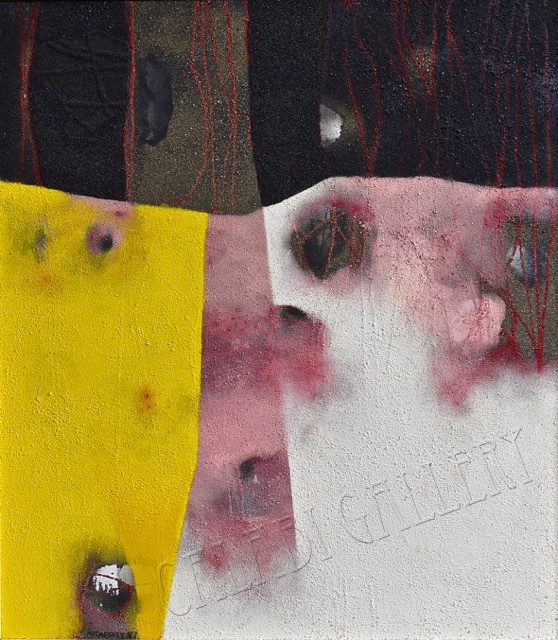Robert P. McChesney: 60 Year Retrospective of Bay Area Master of Abstraction Reception Saturday, April 22nd 4-8pm
Posted on | April 7, 2017 | Comments Off on Robert P. McChesney: 60 Year Retrospective of Bay Area Master of Abstraction Reception Saturday, April 22nd 4-8pm
Compo #A9 by Robert P. McChesney, 1949-51, Enamel and Sand on Masonite, 43×49
ROBERT P. MCCHESNEY : 60 Year Retrospective of Bay Area Master of Abstraction
OPENING RECEPTION: Saturday, April 22nd 4-8pm // EXHIBITION DATES: April 22nd – June 17th, 2017
Robert Pearson McChesney had a long and distinguished career as one of the Bay Area’s preeminent abstract painters. Born in Marshall, Missouri in 1913, he attended Washington University in St. Louis and completed his studies at the Otis Art Institute in Los Angeles. Moving to San Francisco in 1937, he was soon employed by the Federal Art Project painting murals for the Golden Gate International Exposition. He later assisted Anton Refregier in painting controversial murals in the Rincon Annex Post Office. He was deeply involved in the labor movement of the time, and became a merchant marine seaman. In his travels around the globe, he painted watercolors in his free time on board. This experience helped to free him from the boundaries imposed by 6 years of academic training.
While teaching serigraphy at the California School of Fine Arts (now known as the SF Art Institute) in 1950-51, his colleagues included Ed Corbett, Hassel Smith, Ad Reinhardt, Mark Rothko, and Clyfford Still. The students, many of them war veterans, were generally of the same age group as the teachers, which led to a much looser, more congenial vibe than what he had experienced in his student years. In this so-called “Period of Exploration,” the cumulative talent exploded into new modes of expression, from abstract expressionism to Bay Area Figuration. Due to disgust with McCarthyism and loss of their teaching jobs, “Mac” and his wife, sculptor Mary Fuller McChesney, moved to Mexico in a Ford Model A mail truck reconfigured as a camper. En route, they spent time in Taos with Bea Mandelman and Louis Ribak, as well as San Francisco friends Ed Corbett and Richard Diebenkorn. In Mexico, Mac embarked on a new series of paintings, quite different from his previous work, dark, subtle, mystical abstractions in somber tones. When their money ran out, they moved back to the Bay Area. Given a piece of land near the top of Sonoma Mountain, they hand built their house, largely from scavenged materials. Mac then embarked on a new series, “Mountain,” one of which was purchased by the Whitney Museum. The ensuing series, “Arena,” received broad critical acclaim. After that came a series of mixed media works incorporating poured resins, bones, sisal, and other materials.
Most of his work after 1970 consisted of abstract acrylic paintings on wood panels. His methodology was to squirt liquid colors onto the horizontal panel, manipulating them rapidly, creating chaos. Upon drying, he would work methodically to edit out messes, leaving happy accidents exposed, and add new elements, bringing order to chaos. The seeds for this manner of working were sown with his “Slip Sheet” series in 1955. Much of the work from 1970-95 was inspired by desert landscapes. After this he turned to inner and outer space for inspiration.
Mac died in 2008, leaving behind a remarkable body of work. We will be showing a 60 Year Retrospective of his paintings, prints, and drawings, with examples of all styles and periods.
Opening Reception Saturday, April 22nd from 4-8pm at Calabi Gallery 456 Tenth Street in Santa Rosa, CA



 And many more
And many more